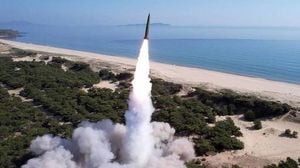On May 7, 2025, tensions between India and Pakistan escalated dramatically as both nations exchanged missile attacks, marking a significant resurgence of military conflict after six years of relative calm. This escalation was triggered by a terrorist attack in Indian-administered Kashmir that occurred two weeks prior, where 26 individuals, including tourists, lost their lives. The Indian government launched 'Operation Sindhurakshak'—a military operation targeting nine locations in Pakistani-controlled Kashmir and the Punjab province—claiming it was a necessary response to the terror attack that had devastated its citizens.
The Indian Ministry of Defense stated that this operation was aimed at dismantling terrorist camps and preventing further attacks on Indian soil. However, Pakistan vehemently denied any involvement in the earlier terror incident, labeling India's military actions as an "unprovoked act of aggression." Pakistan's Prime Minister, Shehbaz Sharif, condemned the missile strikes, asserting that the country would make India pay for this "brutal act of invasion."
According to reports, the missile attacks resulted in the deaths of eight civilians in Pakistan, including children, and left over 30 others injured. Pakistani officials confirmed that the strikes targeted areas such as Muzaffarabad and Kotli. In response to the escalation, Pakistan's military reported shooting down five Indian fighter jets, intensifying fears of a broader conflict.
The backdrop of this military confrontation is the long-standing territorial dispute over Kashmir, a region both countries claim in full but control in part. Since the partition of British India in 1947, India and Pakistan have fought multiple wars over this contested territory. The recent events have raised alarms internationally, with the United Nations Secretary-General António Guterres urging both countries to exercise maximum restraint to prevent a potential nuclear escalation.
Former U.S. President Donald Trump weighed in on the situation, expressing hope for a swift resolution to the conflict, stating, "They have fought for decades, and I just hope it ends quickly." His comments reflect the international concern that the conflict could spiral out of control, potentially leading to a third war between the nuclear-armed nations.
The immediate cause of the heightened tensions can be traced back to the April 22 terrorist attack in Pahalgam, a popular tourist destination in Kashmir. Survivors reported that the assailants specifically targeted Hindu individuals, exacerbating communal tensions in a region already fraught with violence. In the aftermath of this attack, India accused Pakistan of harboring the militants responsible, leading to a series of retaliatory measures, including the expulsion of Pakistani diplomats and the suspension of trade relations.
In an ironic twist, the operation's name, 'Sindhurakshak,' which translates to "guardian of the sindoor"—a red powder worn by married Hindu women—carries a symbolic weight. It reflects the Indian government's assertion that the operation serves as a form of vengeance for the wives who lost their husbands in the recent terror attack.
As the situation continues to evolve, both nations have taken significant steps to fortify their military presence along the Line of Control (LoC), the de facto border separating Indian and Pakistani-controlled territories in Kashmir. Reports indicate that minor skirmishes have been ongoing, further complicating diplomatic efforts to de-escalate the situation.
In addition to military actions, both countries have enacted strict measures affecting civilian life. Pakistan temporarily closed its airspace for 48 hours, redirecting all domestic and international flights to Karachi, while India revoked visas for Pakistani citizens and halted imports from Pakistan. Such measures have heightened public anxiety and fear in both nations, with residents expressing concerns over the potential for a full-scale war.
Despite the rising tensions, analysts suggest that the presence of nuclear weapons on both sides may compel both governments to avoid a full-blown conflict. Some experts believe that both nations will seek to manage the situation below the threshold of nuclear engagement, although the risks remain high.
As international observers closely monitor the developments, the call for dialogue and diplomatic engagement has never been more critical. The United Nations and various nations have reiterated the importance of peaceful negotiations to resolve the longstanding issues surrounding Kashmir. The current trajectory of military actions and retaliatory measures, however, poses a significant challenge to these diplomatic efforts.
In summary, the recent missile exchanges between India and Pakistan highlight the fragile state of peace in South Asia and the potential for conflict to escalate into a larger crisis. With both nations firmly entrenched in their positions and the international community urging restraint, the coming days will be pivotal in determining whether diplomacy can prevail over military confrontation.





